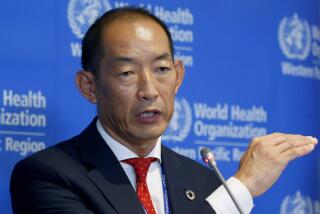Review of Global AIDS Strategy Planned
GENEVA â The World Health Organization agreed Friday to a complete review of its global strategy on AIDS after major donors pressed for rival U.N. agencies to be given a greater role.
Wrapping up its two-week annual assembly, WHO member states unanimously adopted a resolution asking the agency to examine whether closer cooperation is needed within the ranks of the United Nations to beat the deadly disease.
But the assembly was deeply split by another resolution condemning nuclear weapons and asking WHO to seek an opinion from the International Court of Justice on their legal status.
The AIDS move followed a war of words last week over reelection of WHO chief Dr. Hiroshi Nakajima of Japan. Before Nakajimaâs reelection, Western nations had issued veiled hints that the agencyâs future funding was under threat.
One WHO expert said the review was âa move to extricate the AIDS program from the wounded WHO,â but officials denied it was a political move and noted that Japan was one of more than 40 nations that sponsored the resolution.
Diplomats said donor nations that contribute to the $75-million annual budget of WHOâs Global Program on AIDS believed their money could be spent more effectively if U.N. rivalries were pushed out of the way.
The probability that scientists are still some years away from finding a vaccine for the disease makes non-health activities against AIDS, such as education, even more important, experts said.
In a news conference, Global Program Director Michael Merson refused to speculate on what options might come out of the nine-month review.
Merson said that 15 U.N. agencies are already involved in the battle against AIDS and five of them are represented on the Global Programâs management committee.
It is not a question, he added, of whether the WHO should give up its leading role on AIDS, but âhow we are going to apply what we already know about this disease.â
In other resolutions, member states unanimously adopted the agencyâs budget of $1.8 billion for 1994-95 and formally reaffirmed a target set in 1988 for eradicating polio by the year 2000, despite vaccine shortages.
The anti-nuclear resolution was widely backed by delegations from Asia, Africa and Latin America but dismissed as inappropriate and improper by nuclear powers such as Britain and the United States.
More to Read
Sign up for Essential California
The most important California stories and recommendations in your inbox every morning.
You may occasionally receive promotional content from the Los Angeles Times.










